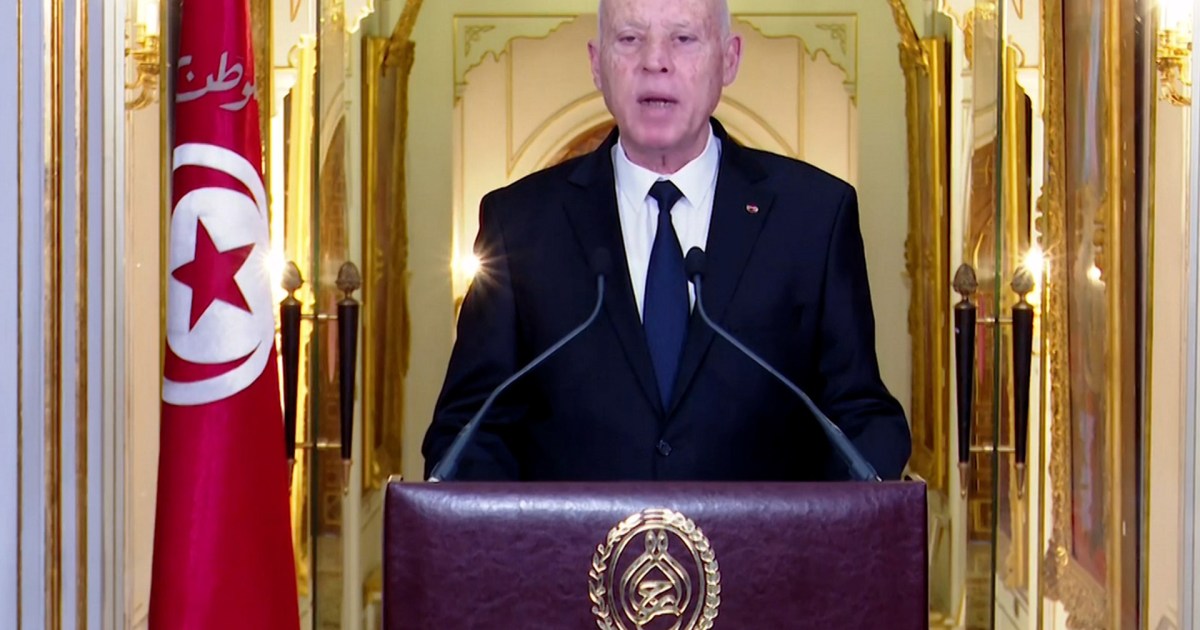David Hurst, editor-in-chief of Middle East Eye, criticized Tunisian President Kais Saied over the referendum on the country's constitution, the preliminary results of which appeared on Tuesday.
Hearst said that the way has been paved for a massive clash between what he describes as Tunisia's new sultan (referring to President Saied) and the unions, "which is the only other organized mass movement after the Ennahda party."
He added that Tunisia is now heading towards dictatorship, and that Saied considers himself "a sultan who can see beyond (the country's) current needs, and a ruler blessed by God" the Almighty.
Indeed, the politicians who supported him a year ago and then abandoned them will not argue about this, let alone the unions that stood by him or the poor, as Hearst put it in his article for the British news site he co-founded.
Dictatorship back
The writer pointed out that the Tunisian president's popularity fell from 80% to 22.3%, pointing out that the young people themselves, who were fully convinced of Said's ability to make major changes, became divided.
Hearst claimed that opposition had spread widely against his attempts to consolidate all power in his hands by imposing a constitution that overturned all checks and balances on his rule by decree.
In order to pass the constitution, Kais Saied resorted to dismissing the Tunisian Election Commission, "which did a good job in 7 previous elections", and replacing it with "flutters" who always agreed with him, according to the article's description.
The editor-in-chief of the news site pointed out that Saeed was accused of violating the election law when he broadcast a video clip on an official channel on the day of the constitutional referendum, which "all parties boycotted except for one, and there were no observers."
"The results of this falsity will be of no value," he said, adding that Saeed himself would pretend to be surprised by the result, but added that this would be a "regression" to the worst years of post-colonial dictatorship in Africa and South America.
The writer goes on in his article to describe the judges who lead the movement to resist the "dictatorship" in Tunisia as brave.
Targeting the judiciary and unions
The Judges Syndicate had recently organized a month-long strike to protest the dismissal of 57 of their colleagues after Saeed accused them of corruption and protecting "terrorists", but his standard for who protects them - according to a Middle East Eye article - is "loose", meaning any judge who disobeys his orders.
Hearst reveals that a new list of "disobedient" - or independent-minded - judges is now being drawn up, which will include the judge who rejected the "fabricated" money laundering case against Rached Ghannouchi, the former parliament speaker and head of the Ennahda party.
The judge also rejected the prosecution's request to arrest Ghannouchi, and released him.
The editor-in-chief of the site commented on this by saying that the arrest of the leader of the Ennahda movement was a message to all political parties that there is no room for political pluralism.
He adds that Tunisia sets an example for others and shows how ineligible its European neighbors are to be a role model, "because they really want to crush the Arab Spring (revolutions)."
The writer believes that the Ennahda movement is getting stronger, as its former members have returned to it, and Ghannouchi himself is more than willing to spend what would have been his third prison term, having previously been imprisoned during the reign of the late presidents Habib Bourguiba and Zine El Abidine Ben Ali.
After the head of Ennahda is removed from him, Kais Saied's next target is unions, as David Hearst speculates in his article.

